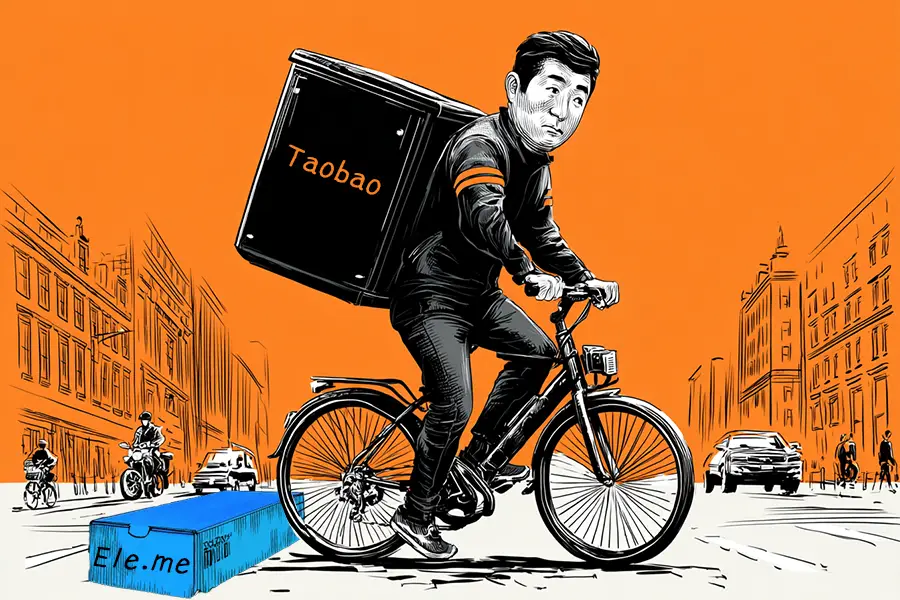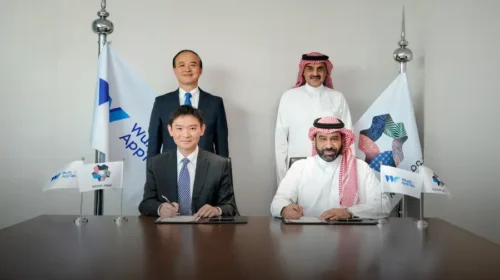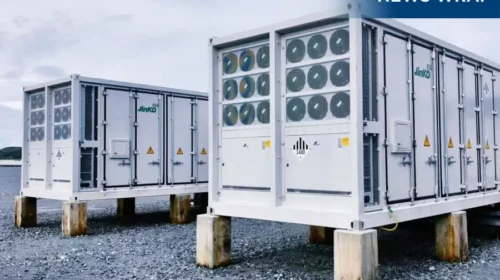China’s corporate pivots: Alibaba’s food delivery gambit and WuXi AppTec’s geopolitical hedge

“Ele.me actually means ‘Are you hungry?’ So it’s definitely associated with eating and probably wouldn’t be a great brand if you were buying some toilet paper.”

By Doug Young & Rene Vanguestaine
Two recent, seemingly unrelated corporate maneuvers offer a telling glimpse into the strategic pivots major Chinese companies are making in response to shifting consumer habits and global political currents. In one corner is e-commerce giant Alibaba (BABA.US; 9988.HK), which is overhauling its local delivery strategy by retiring a household brand. In another, biotech champion WuXi AppTec, squeezed by U.S.-China tensions, is turning its attention and investment toward the Middle East.
Ele.me, a name synonymous with food delivery for over a decade in China, is being retired. Its iconic blue-clad riders are being refitted into Taobao Instant Commerce orange, signaling a significant strategic shift by parent company Alibaba. We believe this is more than just a cosmetic change. It’s a logical and necessary evolution from food-focused delivery to a broader “instant commerce” future. The name Ele.me, which translates to “Are you hungry?”, is simply too narrow for an ambition that now includes delivering everything from groceries to toilet paper within an hour.
This move brings Alibaba in line with competitors like JD.com (JD.US; 9618.HK) and Meituan (3690.HK), which have long operated their delivery services under a single, unified brand. We think there’s a clear logic in bringing all of Alibaba’s flash delivery commerce under the powerful and widely recognized Taobao brand. Until now, customers in the Alibaba ecosystem navigated one brand for general e-commerce and another for food.
The rebranding also seems to acknowledge past shortcomings. As observers on the ground in China, we’ve noted that since its acquisition by Alibaba in 2018, Ele.me has often been a laggard compared to the more sharply focused Meituan, which steadily gained market share. We believe Alibaba may have lost focus on the Ele.me business as it diversified into a wide array of ventures, from cloud computing to entertainment.
This strategic shift signals a renewed focus. The decision indicates that top management recognizes the need to do a much better job and is willing to unify the business under the successful Taobao management structure. But will it be enough to put Alibaba back in the race against Meituan and a newly aggressive JD.com? We think there’s an opportunity, but it won’t be easy. Coming from behind requires significant capital. Our guess is that Alibaba will have to throw a fair amount of money into the effort to regain lost ground. While the goal may not be to reclaim the top position, they certainly have the financial muscle to turn the business around and become a much stronger competitor in the burgeoning instant commerce arena.
Geopolitics and money drive biotech’s Saudi move
Meanwhile, a very different strategic pivot is unfolding with WuXi AppTec (2359.HK), one of the biggest corporate names you’ve never heard of. The company, which provides essential services for drug development and manufacturing, has become a poster child for the collateral damage of the U.S.-China trade war. Facing growing restrictions in the U.S. due to the sensitive nature of its work, WuXi AppTec has begun selling off non-core assets and has announced potential plans to build a major new facility in Saudi Arabia.
The drivers behind this move are twofold: money and geopolitics.
On the money front, Saudi Arabia and other Gulf nations have made it abundantly clear they are using their vast energy wealth to try to diversify their economies away from oil and gas. They are actively creating programs and offering incentives to attract what we would call forward-looking industries, including high-tech, AI, and biotechnology.
On the geopolitical front, the move aligns with Beijing’s broader push to forge stronger economic and political ties with the Middle East. For WuXi AppTec, it’s a pragmatic solution to its troubles in the U.S. The pandemic served as a stark wakeup call for Washington, revealing a critical dependence on China for everything from medical equipment to essential drugs. Consequently, the U.S. has been working to rebuild its domestic capabilities and reduce its reliance on Chinese partners.
We think it makes perfect sense for a Chinese company like WuXi AppTec to establish a manufacturing base in a third country. Building a new facility in the U.S. is likely untenable, whereas Saudi Arabia is offering financial incentives and a path to de-risk from direct U.S.-China friction. Producing in the kingdom will allow its products to be labeled as made in Saudi Arabia, creating a degree of separation from Beijing.
It’s worth remembering how this dependency arose in the first place. A significant portion of drug research moved to China historically due to strong opposition to animal testing in the U.S., a critical component of pharmaceutical development. Now, as Chinese firms look to the Middle East, we believe that for some, the move may be as much about “fashion” or aligning with government policy as it is about pure business strategy. And companies should not be naïve: they are trading one sphere of influence for another, as the Saudi government will undoubtedly have a say over operations on its soil.
About China Inc
China Inc by Bamboo Works discusses the latest developments on Chinese companies listed in Hong Kong and the United States to drive informed decision-making for investors and others interested in this dynamic group of companies.
Subscribe to China Inc on your favorite app:








